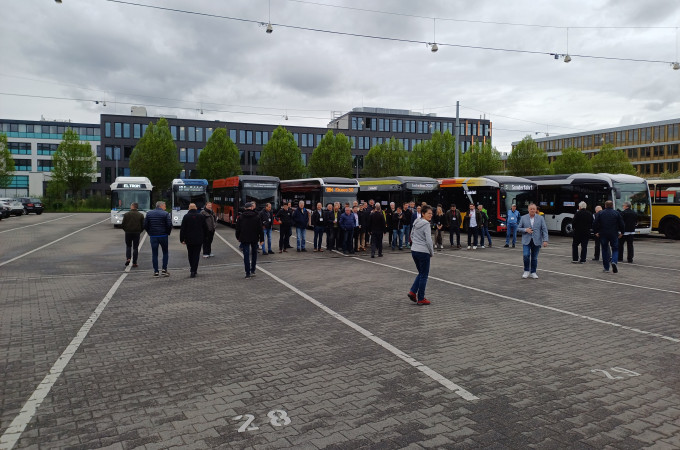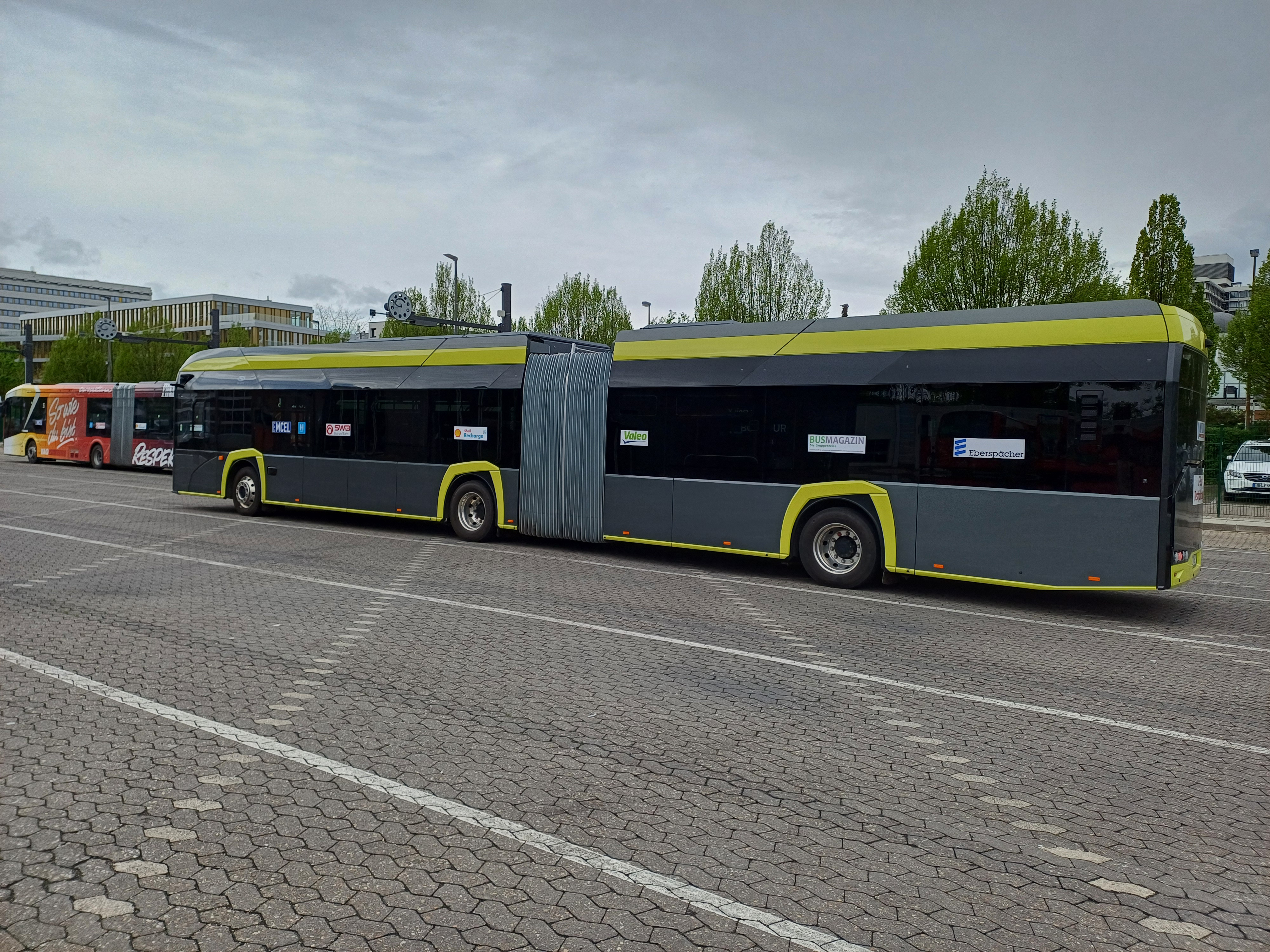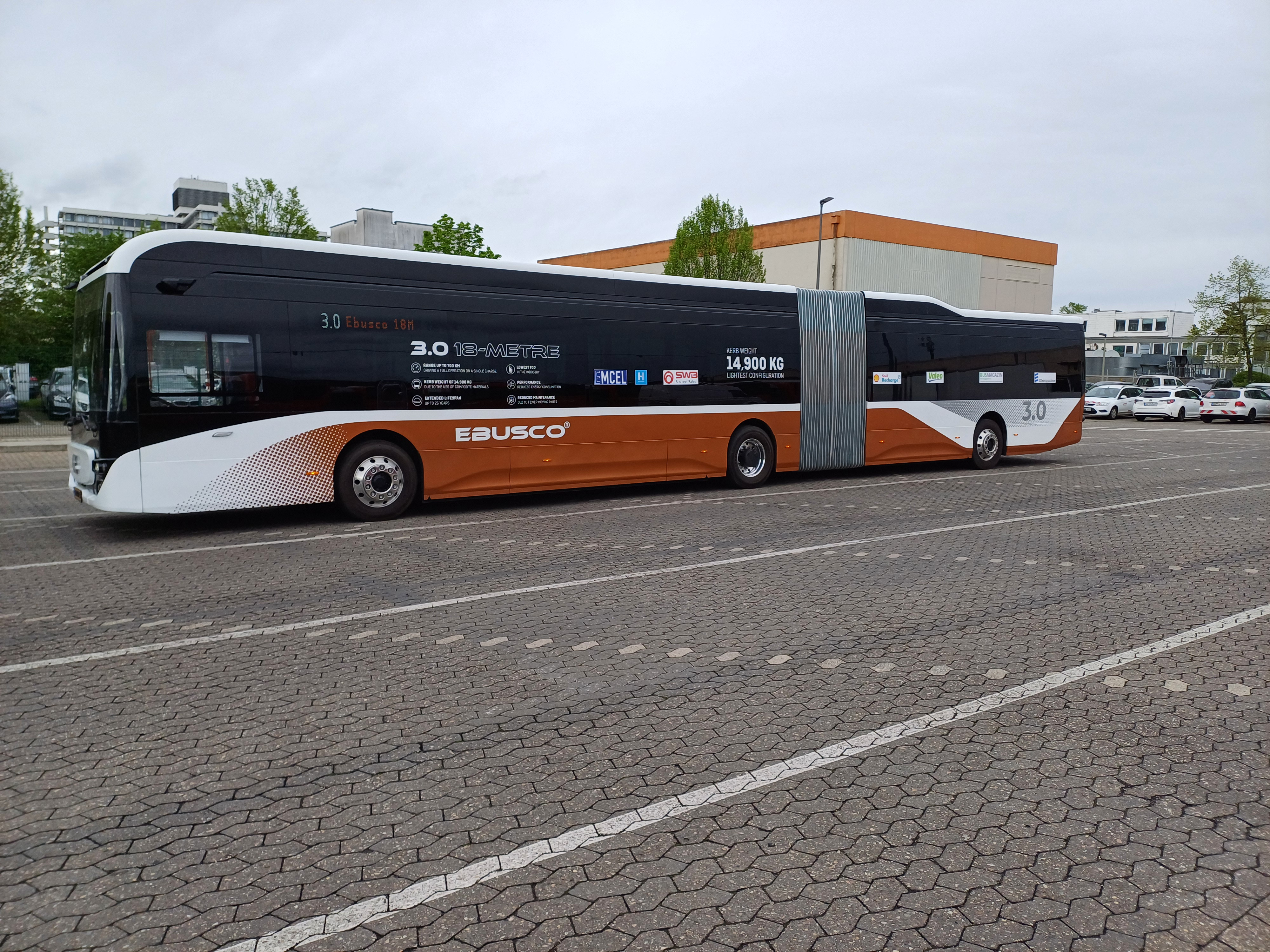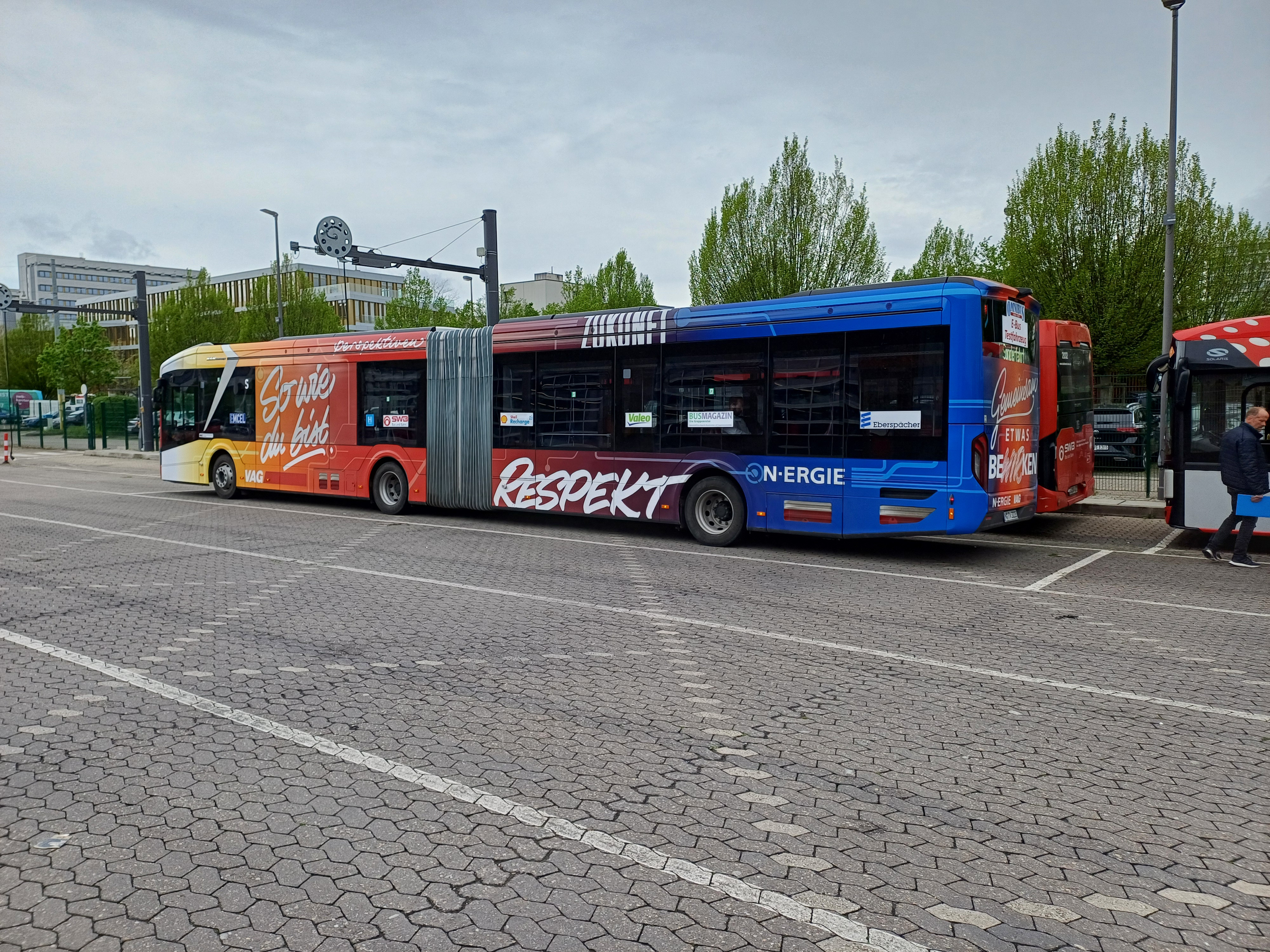2024 Omnibus Report
By Luke Willetts - 9th May 2024

Stadtwerke Bonn bus depot
Germany – Organised by the German magazine Omnibusspiegel, the European e-bus market gathered in Bonn, Germany to test drive several OEM’s new electric bus (some articulated) offerings. T&BB was in attendance as we gathered at the Stadtwerke Bonn bus depot to begin comparison testing. Registered vehicles included: the Ebusco 3.0, MAN Lion's City 18 E, Mercedes-Benz E-Citaro G, Solaris Urbino 18 electric as well as the MCV C 127 EV and the Rampini Eltron.
Articulated Buses
Solaris
Kicking off proceedings was the Urbino 18 electric from Solaris Bus & Coach SA. The 18m electric bus is propelled by electric axles with integrated electric motors. Energy is stored in high-density Solaris High Energy+ batteries supplied by Impact Clean Power Technology. Each of the new generation high energy NMC batteries has 100kWh of power output, with a battery configuration of four up to eight batteries all mounted on the rooftop. An 800kWh battery pack provides a range of 600km. High-powered charging is accessible. Charging options are fully customisable (i.e. panto-up, panto-down and plug-in charge).

Solaris Urbino 18
The buses are fully compliant for wheelchair users and offer the capacity to carry up to 160 passengers, including a maximum of 52 seated. The Urbino features a monitoring system, a passenger information system, air-conditioning, USB charging ports and an electric heating system.
The new generation Urbino has a new modular drive meaning no engine tower, greater flexibility in terms of passenger space and better weight distribution as well as easier maintenance.
Crunching the business numbers, Mateusz Figaszewski, Director of e-mobility at Solaris told T&BB that the company has over 2,000 battery-electric buses operating in over 160 cities in 22 countries. The company has also delivered over 180 hydrogen-powered buses with another 700 in the orderbook.
Offering 9m, 12m, 15m, 18m and 24m buses, the charging options are fully customisable as previously mentioned. The company is number two in terms of the number of delivered electric buses in EU countries in 2023 with 14.2% of the market share of battery city buses over 8T GVW. When it comes to total zero-emission buses (electric + hydrogen) delivered in 2023 in the EU, Solaris is number one with a 15.2% market share. Looking at the aggregate success, this is not a one-year achievement. Over the last ten years (since 2013), Solaris has been number one in terms of BEV and FCEV city buses over 8T delivered in the EU with a 14.5% market share.
Ebusco
In late 2022 electric bus manufacturer, Ebusco Holding NV, based in Deurne, unveiled the Ebusco 3.0 18-metre articulated city bus, designed for urban and regional transport operations. With a capacity for 150 passengers, it is powered with a choice of cobalt-free LFP 350+ and 500+ kWh battery packs, offering a range of up to 700km.

Ebusco 3.0 18-metre articulated city bus
Wolfgang Köster, key account manager at Ebusco was on hand to tell us more about the vehicle. Köster said that the vehicle utilises composites, giving it a lightweight design, with floor-integrated batteries providing a low centre of gravity, better driver handling and increased passenger capacity. The composite walls are injected with a foam allowing for high thermal insulation, reducing energy consumption and increasing the range of the vehicle.
Although the company has been coy over the exact numbers in its order book, Ebusco has revealed that the bus is operational in cities such as Oslo, Orebro Lan, Rouen and Växjö. The company enhanced production at its headquarters in Deurne, with a dedicated line for articulated bus models to meet increasing demand.
Daimler Buses
Frank Mandel from Daimler Buses was in attendance to demonstrate the 18.1m all-electric Mercedes-Benz eCitaro G 146-passenger capacity articulated bus. Initially launched in 2020, the maximum battery capacity is 686 kWh on the articulated buses. The bus is equipped with batteries supplied by Akasol AG, ZF axles and a ZF AVE 130 electric drive axle. Different charging options include plug-in charging, pantograph and charging rails. The vehicle was developed as a modular system to combine different technologies.

Mercedes-Benz eCitaro G articulated bus
From July 2024, all new buses sold in the EU must comply with the updated General Safety Regulations (GSR). The regulations require a range of mandatory advanced safety features. Daimler has equipped the new generation vehicles with Active Brake Assist 2, multi-purpose cameras, short and long-range radar, sideguard assist 2, frontguard assist and traffic sign assist to comply with this new legislation.
The eCitaro fuel cell with a Toyota fuel cell range extender was launched at the UITP Global Public Transport Summit in Barcelona in June 2023 and the first vehicles were shipped earlier this year. The eCitaro fuel cell utilises a battery-electric drive system with high-performance NMC3 batteries (supplied by Akasol AG) while the Ballard fuel cell acts as a hydrogen generator to extend the range. The vehicle has a BEV single-charge range of between 350km – 400km depending on the number of passengers and road topography. Furthermore, the articulated version offers space for 128 passengers. Before its launch, the vehicle underwent extreme weather testing in the Italian Alps. The hydrogen tanks were subjected to fire, impact, and temperature resistance tests, meeting the UN ECE R 134 standard.
Operating as a range extender, the second-generation Toyota fuel cell is a heavy-duty unit with a maximum output of 60 kW. The range extender is operated very efficiently at around 30 kW at its best point. It operates in a voltage range from 400 to 750 volts.
MAN
Sebastian Lindner from MAN Truck & Bus (Corporate Communications) was on hand to debrief the delegation about its 18-metre electric city bus, the MAN Lion’s City 18 E as well as the company’s e-mobility roadmap. According to Linder, the vehicle model is proven and tested, racking up over 125000 kilometres. First released in 2020, the electric articulated bus can accommodate up to 120 passengers (with a permitted gross vehicle weight of 30 tonnes). The MAN Lion’s City 18 E has two electric central motors, which are electronically synchronised and connected to the second and third axles. The fully electric driveline produces outputs of between 320kW and a maximum of 480kW with energy coming from eight lithium-ion (NMC) modular battery packs with 640kWh of installed capacity. The two driven axles increase the maximum energy recovered under braking, according to Linders.
The batteries, which are supplied from the Traton Group’s modular kit, have an intelligent temperature management system that has been optimised for use in city buses. The eight battery packs, which are located on the roof of the articulated bus offer the advantage of being located away from the rear of the vehicle, an area, MAN points out, is at higher risk of a collision. The MAN Lion’s City 18 E offers a minimum range of 200km (and up to 270km in favourable conditions) over the entire service life of the batteries. The batteries are charged at the depot via a Combined Charging System plug (CCS). With an average charging power of 100kW and a maximum power of up to 150kW, the articulated bus can be fully charged in less than four hours.
As part of its e-mobility roadmap, MAN will be assembling its own battery packs at its plant in Nuremberg for its commercial vehicle fleet beginning Q1 2025. The facility will have a production capacity of 100,000 battery units a year. Of the EUR 100 million invested, the Bavarian state government pledged EUR 30 million to support construction as well as research and development into battery assembly, cell chemistry, battery safety and battery recycling between 2023 and 2027. Finally, Linders confirmed that MAN will be delivering its first electric HGV truck next year.

MAN Lion’s City 18 E
Other Buses
MCV
Pierre De Lory was there to explain that the Egyptian bus manufacturer, MCV based in Cairo is a new player in Germany and Austria. MCV is an owner-driven company set up in 1994, mainly building bus bodies for many years. It has over 6,000 workers in the plant in Cairo covering a 303,000-square-metre production area and built its first bus in 1998 on a Volvo chassis. In 2022 the company registered a German sales division under the MCV Deutschland GmbH name and began building an e-bus on its own chassis for the German market. This led to the development of its fully electric 12m long C127 EV low-floor bus, which we had the opportunity to test drive at the Omnibus event. The first order for this model was made by Rheingold-Reisen in Wuppertal, for 10 units. The bus has a capacity of 79 passengers, with 39 seated. The vehicle is also available in a 10.6-metre variable.
The C127 EV has an electric central motor which drives the rear ZF axle. The energy is provided by six battery packs on the roof totalling 462 kWh, provided by Forsee Power. The bus features Ventura doors, a Konvekta CO2 heat pump and a purely electric auxiliary heater. MCV C127 EV features camera mirrors and cornering assist. 80% of the bus is produced in-house, meaning a reduced reliance on component suppliers. The company is investing in aftermarket services (developing a service network) in Germany, a mobile support/service team, and a spare parts network.
Rampini
Caterina Rampini, Vice President and CEO of Rampini Carlo SpA displayed the low-floor Eltron midibus, which has been on the market in Europe since 2010. Available in 2 or 3-door versions, it is 8 metres long and 2.2 metres wide and is available with two or three doors. It carries up to 48 passengers and can accommodate one wheelchair. It is powered by a 230-kW Dana TM4 motor and 280-kWh of energy capacity, providing a range of over 300 kilometres. The bus is equipped with a ZF frontaxle with independent suspension and an LFP battery pack with 4 or 6 Modules, with the latter totalling 210 kWh power output. The batteries are controlled by a Battery management system (BMS) developed in-house by Rampini. Charging with CCS or Pantograph with 22 up to 120 kW is available.

Rampini Eltron midibus
Last year, Rampini announced that it successfully bid for a tender for up to 280 battery electric buses organised by Consip SpA, a public joint-stock company which acts as procurer for the Ministero dell’Economia e delle Finanze (Italy’s Ministry of Economy and Finance). The tender is funded by the ‘National Recovery and Resilience Plan’ (PNRR), Italy’s EUR191.5bn finance package from the European Commission to foster a post-pandemic economic recovery. Rampini currently has a presence in Italy, Germany, Austria, Greece and France.



